'We want change. Not promises!': Mass anti-corruption rallies hit Russia
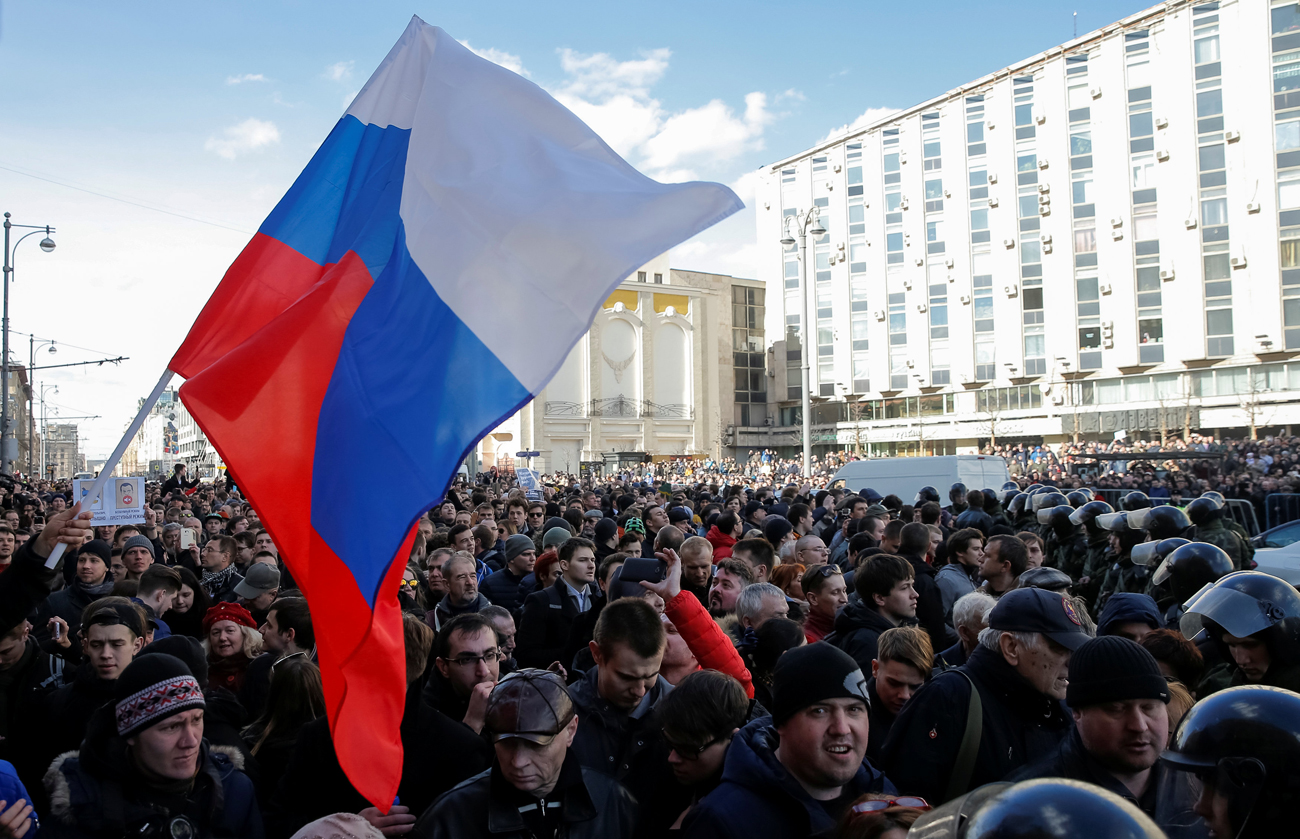
Opposition supporters attend a rally in Moscow, Russia, March 26, 2017.
Reuters Opposition supporters attend a rally in Moscow, March 26, 2017. / Photo: Reuters
Opposition supporters attend a rally in Moscow, March 26, 2017. / Photo: Reuters
On March 26, protests against corruption were held across Russia, the largest of which took place on Moscow’s main central street, Tverskaya. According to the Interior Ministry, around 7,000 to 8,000 people rallied in the capital, although the protest organizers are yet to release their estimates.
The protests were fueled by the government’s failure to respond to the investigation by opposition leader Alexei Navalny’s Anti-Corruption Foundation (FBK) into Prime Minister Dmitry Medvedev. It’s claimed he has embezzled a secret empire worth $1.2 billion.
Most of the demonstrations, including the Moscow march, had not been sanctioned by the authorities, resulting in multiple arrests and clashes with the police. In the Russian capital alone, some 850 people have been detained.
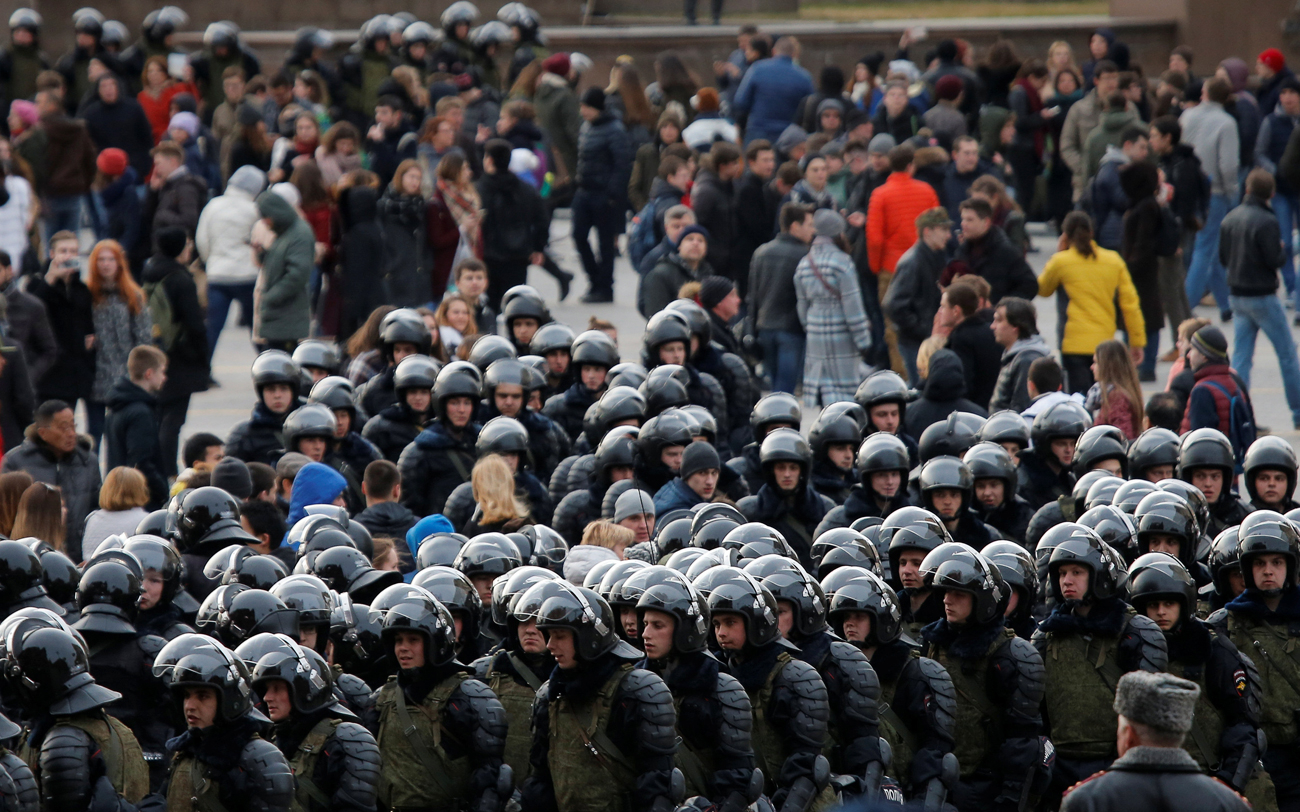 Law enforcement officers gather as they block opposition supporters in Moscow, March 26, 2017. / Photo: Reuters
Law enforcement officers gather as they block opposition supporters in Moscow, March 26, 2017. / Photo: Reuters
Since the FBK film – “He is not Dimon to you” – making the allegations against Medvedev was released online, it has received 13 million views. Several days before the protests, the Moscow police said they could not be held responsible for unsanctioned rallies. Four hours before people protested on Tverskaya scores of special vehicles and buses with riot police lined the streets. Demonstrators, many of whom looked like ordinary people out for a walk, marched south towards the Kremlin. The large majority were peaceful, did not seek clashes with the police, and urged against rash actions. They objected to comparisons with Ukraine’s 2014 Maidan revolution and took pictures with riot police in the background.
Whatdoyouwant?
"How shall we recognize our own? Are they with the authorities or not?” – these were the questions being asked in the somewhat confused crowd 15 minutes before the protest. People were coming out of the subway and joining the masses watching the police with suspicious, worried eyes. "Look, are they all for corruption, since we are against it?" asked a surprised elderly lady pointing at the officers, who were staring back at the growing crowds. Features typical of opposition protests were missing: There were no leaders, megaphones, or a clear plan of action. People didn’t know if they should be standing or moving.
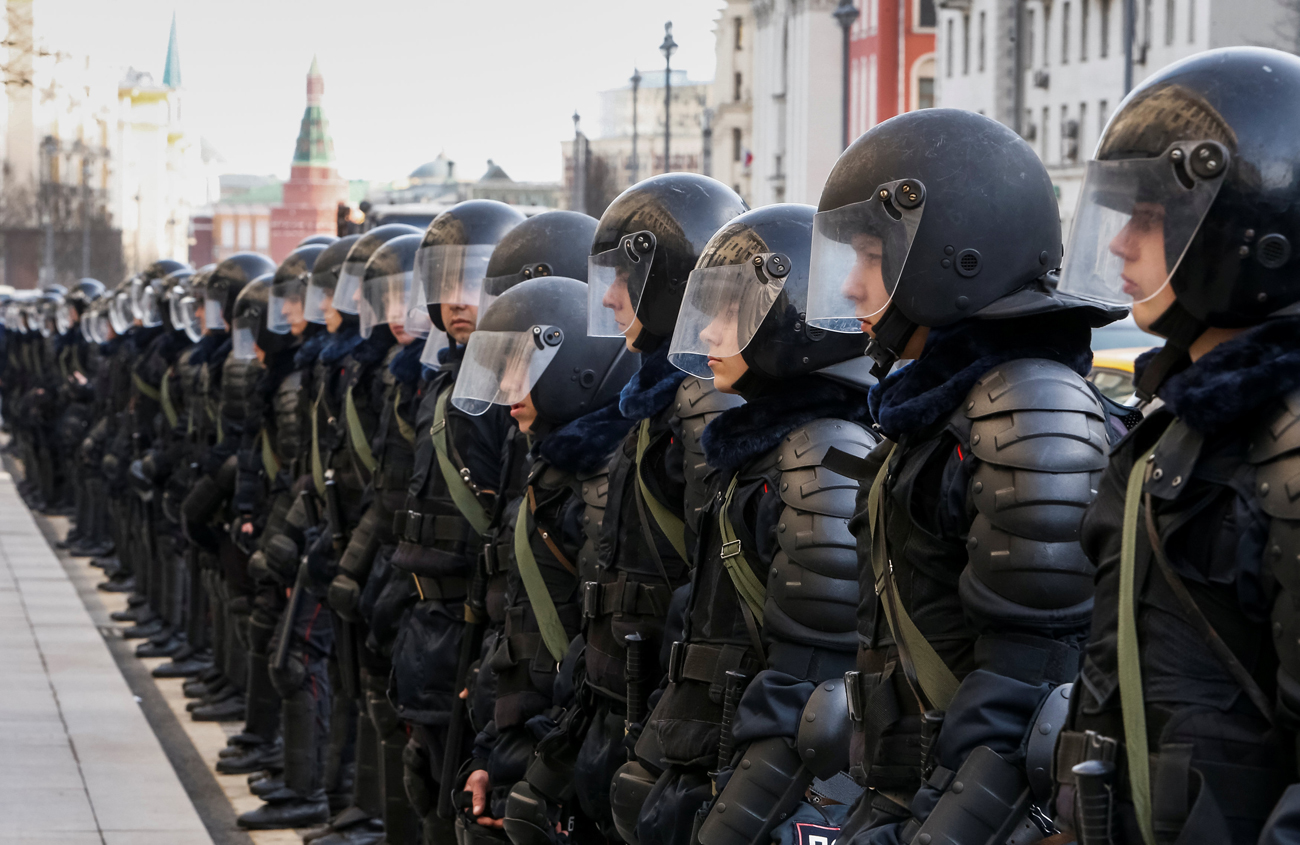 Law enforcement officers line up along a street as they block a rally in Moscow, March 26, 2017. / Photo: Reuters
Law enforcement officers line up along a street as they block a rally in Moscow, March 26, 2017. / Photo: Reuters
Many were watching live broadcasts from other parts of Tverskaya. "In Pushkinskaya [square], a guy holding a placard that read ‘Corruption kills’ has been detained," a man with a selfie stick and a large smartphone announced loudly. People immediately surrounded him, thinking he was the best informed among them. Another man suggested that the police would not be able to put a crowd of 500 people into police vans: "To stop a crowd like that, the only option is to start killing them”.
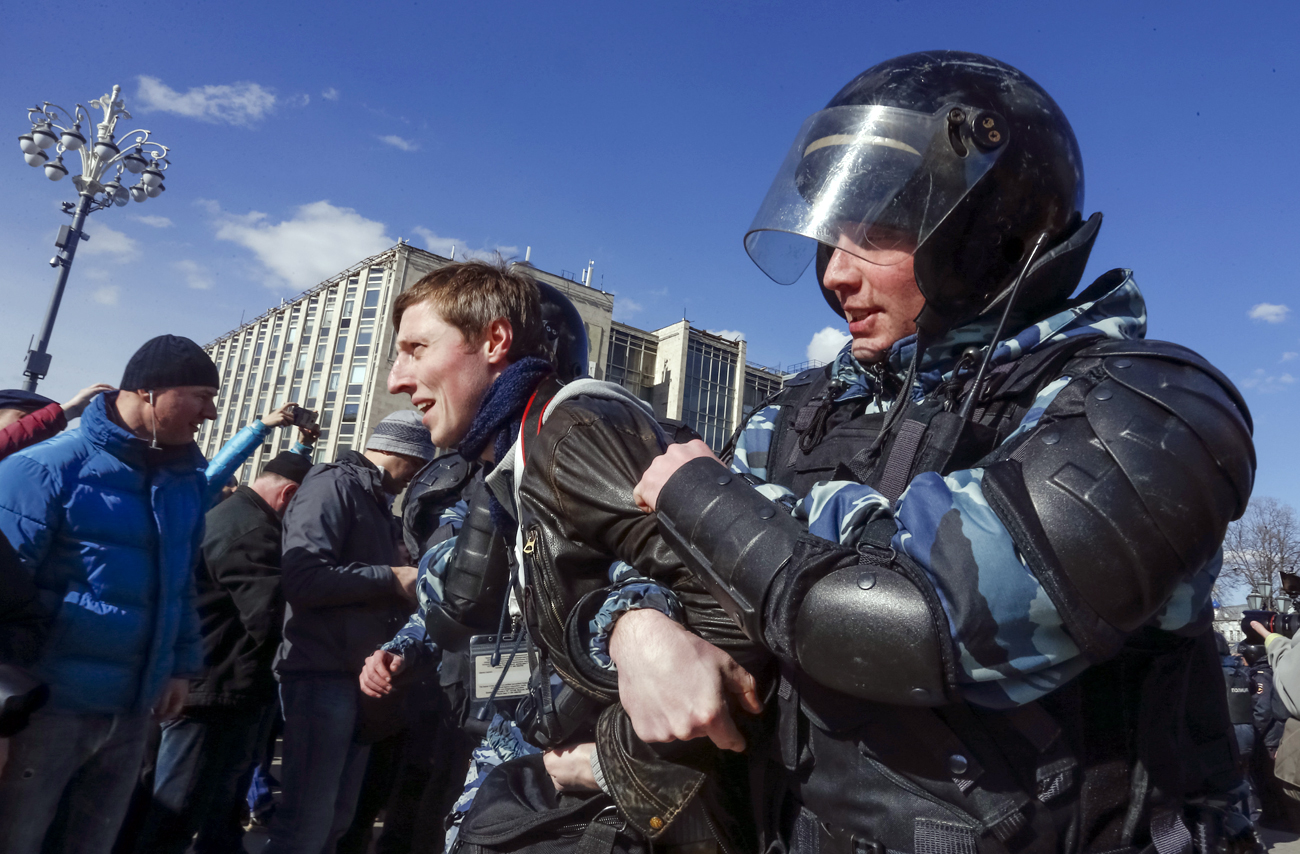 Law enforcement officers detain an opposition supporter during a rally in Moscow, March 26, 2017. / Photo: Reuters
Law enforcement officers detain an opposition supporter during a rally in Moscow, March 26, 2017. / Photo: Reuters
“What do we want? Do we want to fight or what?” asked an intellectual looking young man. “I and you know one thing – the dialogue with the authorities is over. We want change. Not promises. The first thing why we are here is to demand the resignation of the government, not just Medvedev.”
From the other side of the square, somebody suggested deciding there and then whether "Crimea is ours or not ours", but this was quickly dropped as others said this discussion was for another time, as this was not what the protest was about.
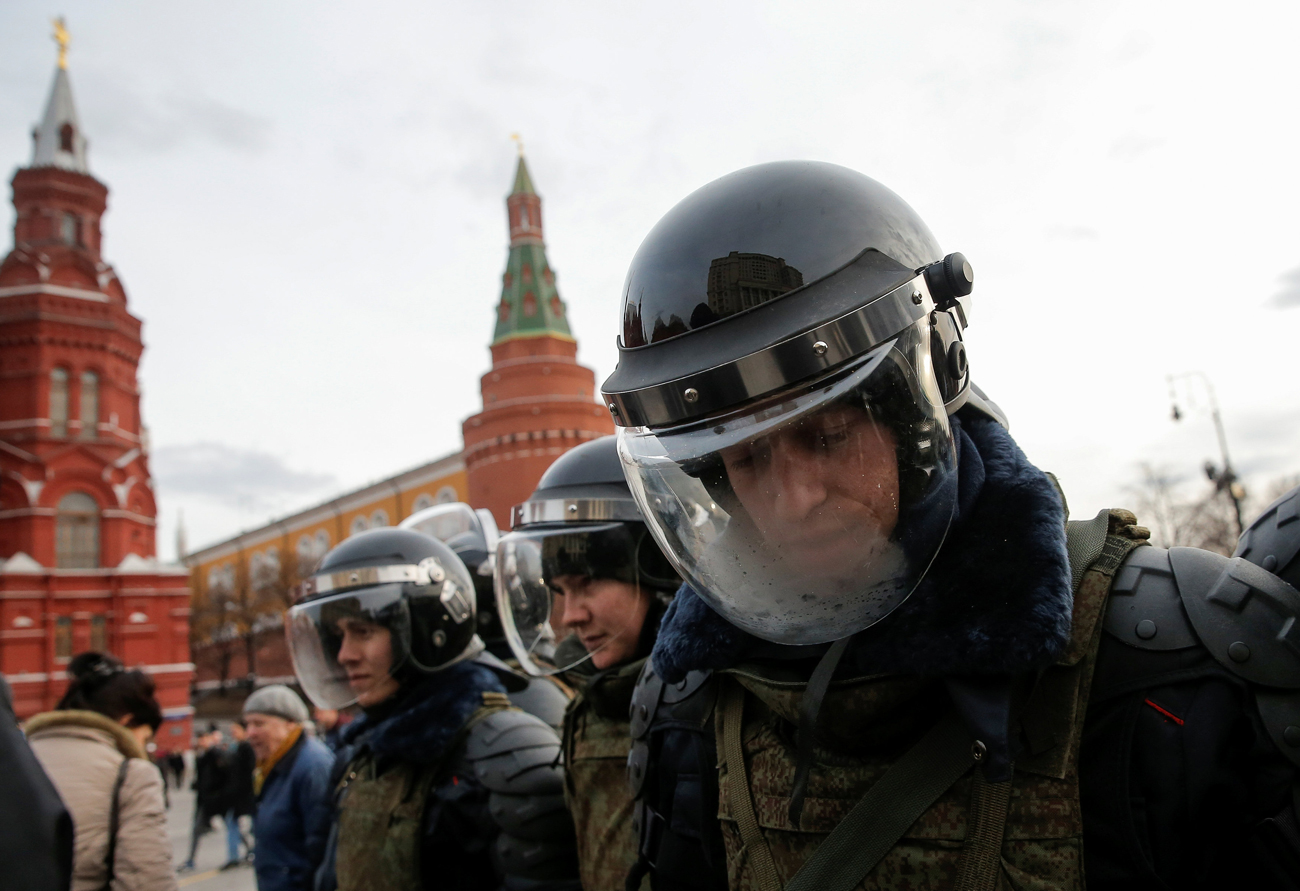 Law enforcement officers line up as they block opposition supporters near Kremlin in Moscow, March 26, 2017. / Photo: Reuters
Law enforcement officers line up as they block opposition supporters near Kremlin in Moscow, March 26, 2017. / Photo: Reuters
A man called Oleg standing with his elderly mother also spoke out: “We all demand an answer to the film that Navalny released. The media are silent, the authorities are silent, as if nothing had happened. Although that film very much looks like the truth. Why have they not denied anything, why have they not sued Navalny for libel if it's a lie?” He also told me his parents continue working beyond their retirement age because they do not have enough money to buy food. “The authorities ask us to be patient, but why don’t they tell us what for? It is time they explained at least something,” he added.
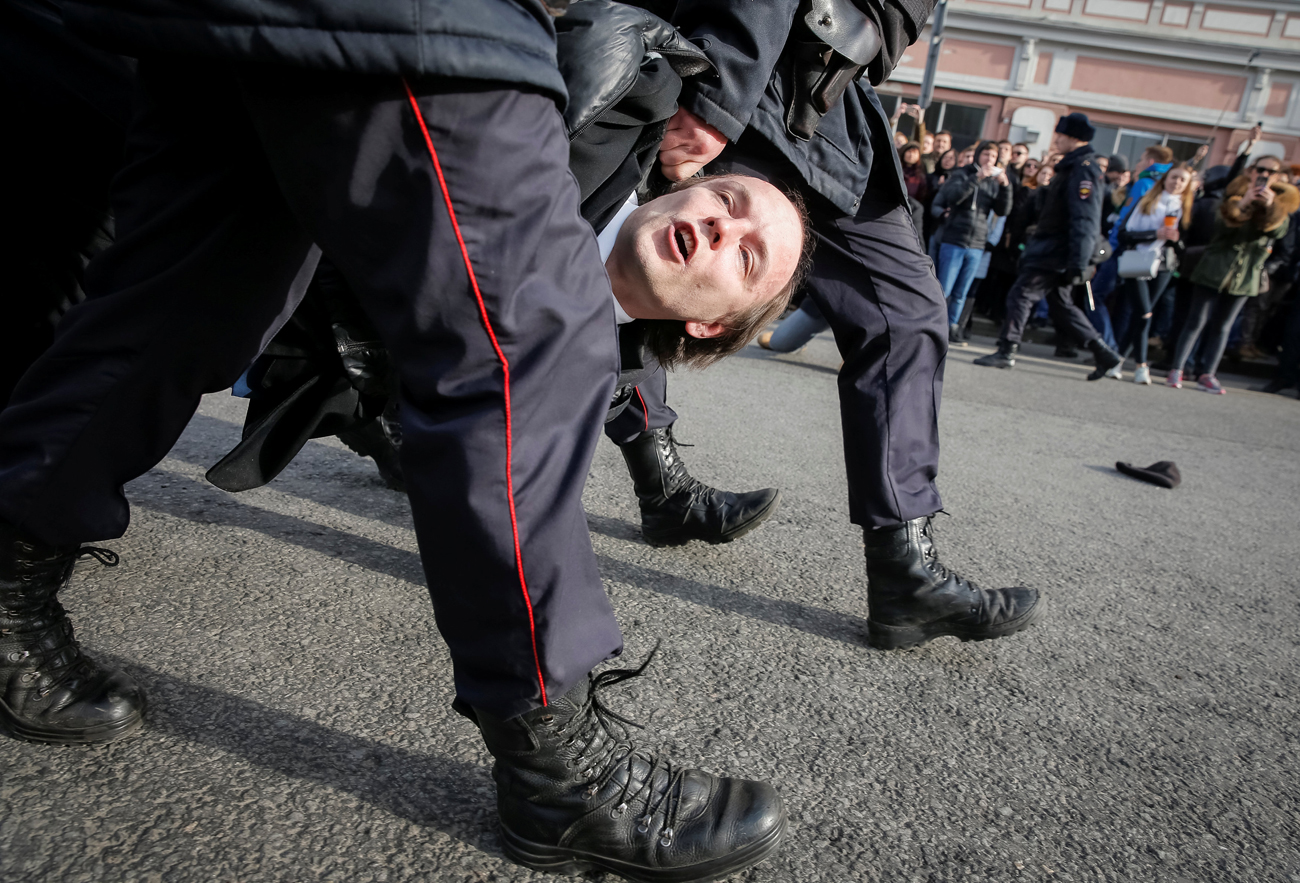 Law enforcement officers detain an opposition supporter during a rally in Moscow, March 26, 2017. / Photo: Reuters
Law enforcement officers detain an opposition supporter during a rally in Moscow, March 26, 2017. / Photo: Reuters
Somebody in the crowd suddenly shouted: “Let’s go” and people start moving towards the Kremlin. Oleg and his mother followed without hesitation. Aren’t you afraid of clashes with the police? – I ask him. “It is time we stopped being afraid, we are tired of being afraid. Something needs to be done,” he replied.
Defending the idea
In Pushkinskaya Square, the crowd was already so dense it was struggling to move along the sidewalk as a police cordon prevented people from walking on the road. Traffic along Tverskaya was also partly paralyzed, with drivers honking their horns. A helicopter buzzed overhead and policemen urged people to take the subway to Sokolniki Park on the outskirts of Moscow to stage a rally there (that was the venue for the protest proposed by the city authorities, but the organizers refused to accept it). But no one was listening.
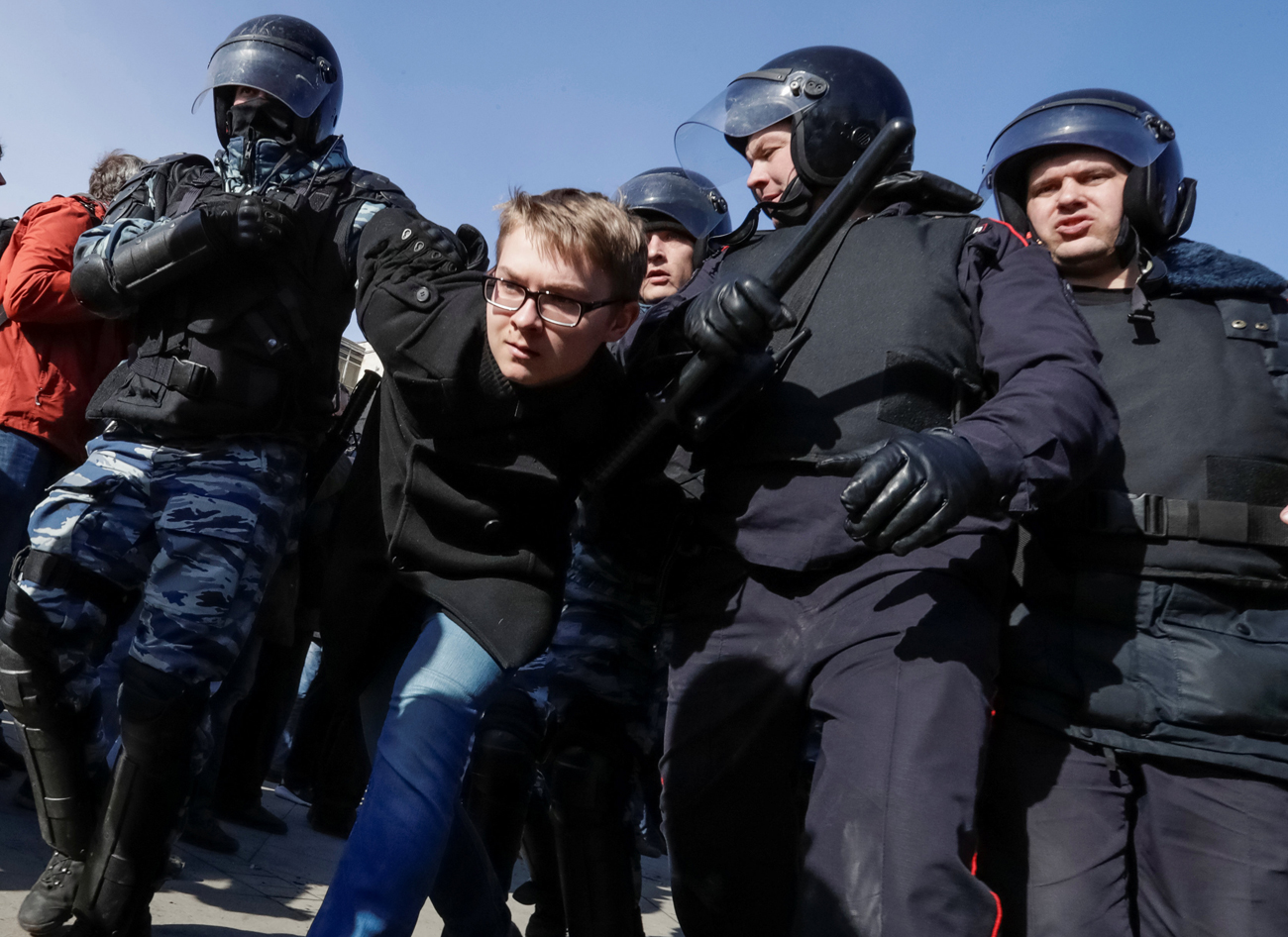 Law enforcement officers detain an opposition supporter during a rally in Moscow, March 26, 2017. / Photo: Reuters
Law enforcement officers detain an opposition supporter during a rally in Moscow, March 26, 2017. / Photo: Reuters
“Guys, this is a trap!” a man cried. But there was no trap. There were just too many people. Together with the police, the protesters were being watched by so called “neighborhood guards”; volunteers brought in to maintain law and order. I discovered that they had instruction “should anything happen”, but they categorically refused to disclose any further details about it and suggested I “get lost.”
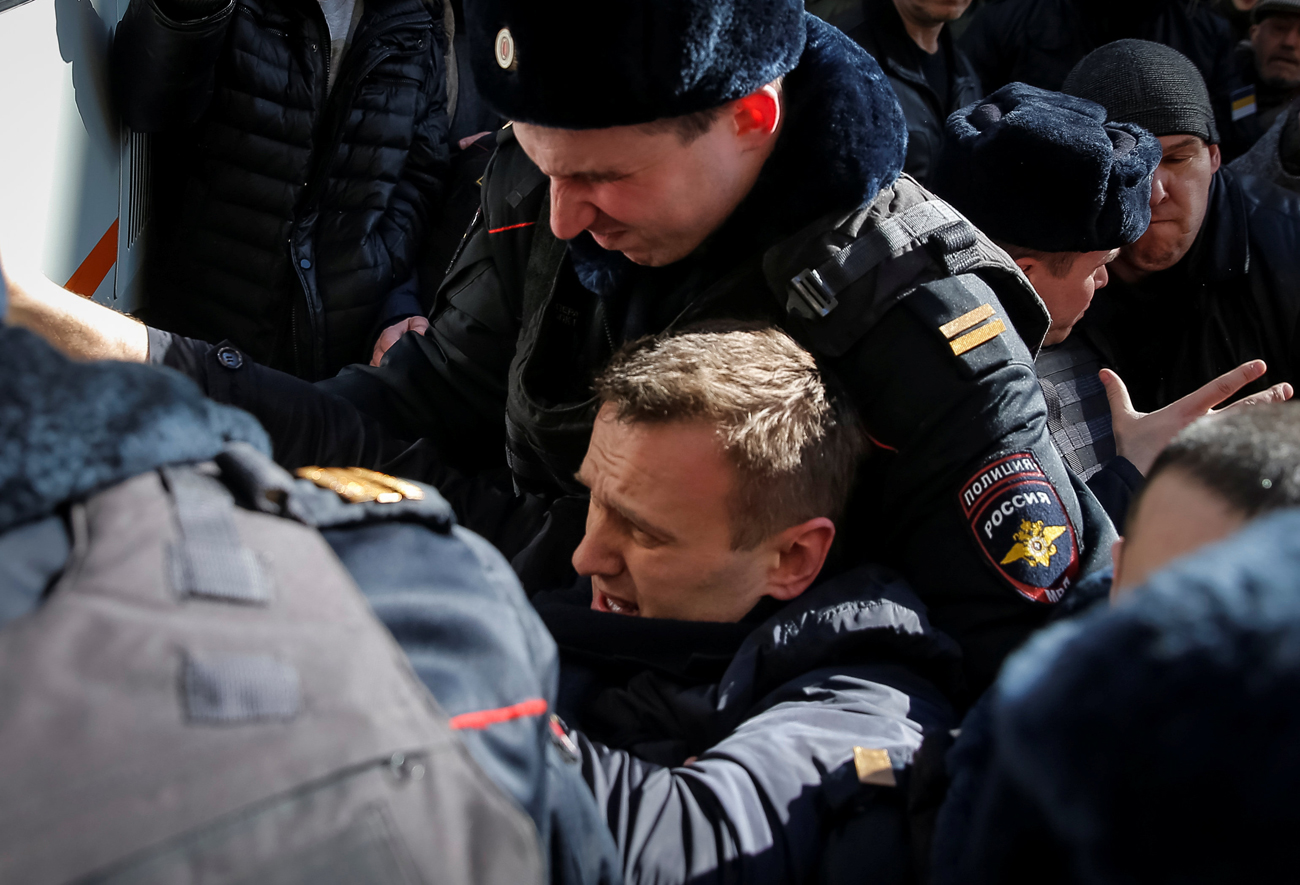 Police officers detain anti-corruption campaigner and opposition figure Alexei Navalny during a rally in Moscow, March 26, 2017. / Photo: Reuters
Police officers detain anti-corruption campaigner and opposition figure Alexei Navalny during a rally in Moscow, March 26, 2017. / Photo: Reuters
There were many students in the crowd, and most of them insisted that they were here not for the sake of Navalny, "but for the sake of the idea”. At that moment I received a news alert on my phone that Navalny had been detained. The protesters put a car in front of the police van carrying him, to prevent the opposition figure being taken away. The riot police raised their batons.
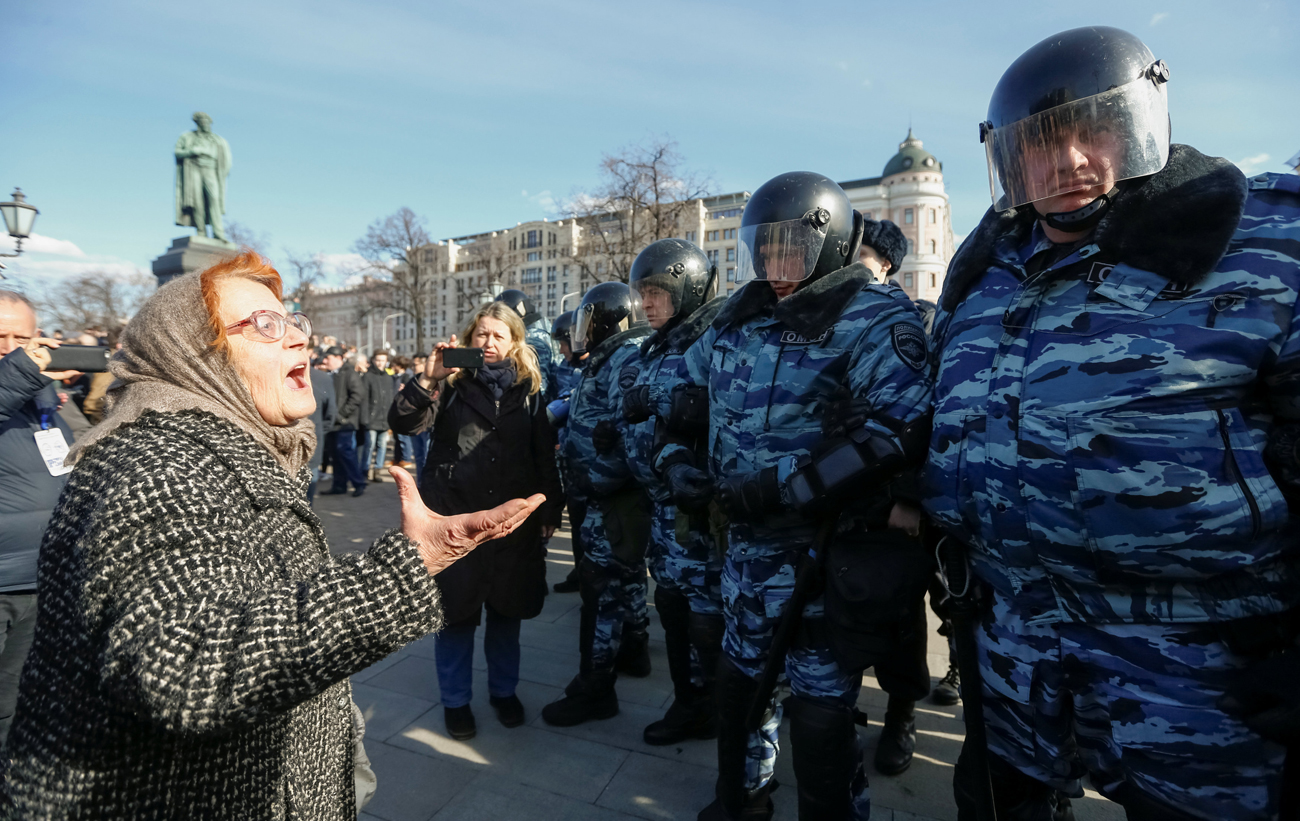 A woman argues with law enforcement officers as they block a rally in Moscow, March 26, 2017. / Photo: Reuters
A woman argues with law enforcement officers as they block a rally in Moscow, March 26, 2017. / Photo: Reuters
“I came here to get at least some reaction, because they do not say anything at all! Frankly speaking, it is very annoying, people pay taxes and these taxes are used [by the authorities] to finance a lifestyle that is outrageous, to put it mildly," a student called Konstantin told me.
Two other students nearby were swearing and filming riot police on the other side of the road carrying somebody by their arms and legs to a police van.
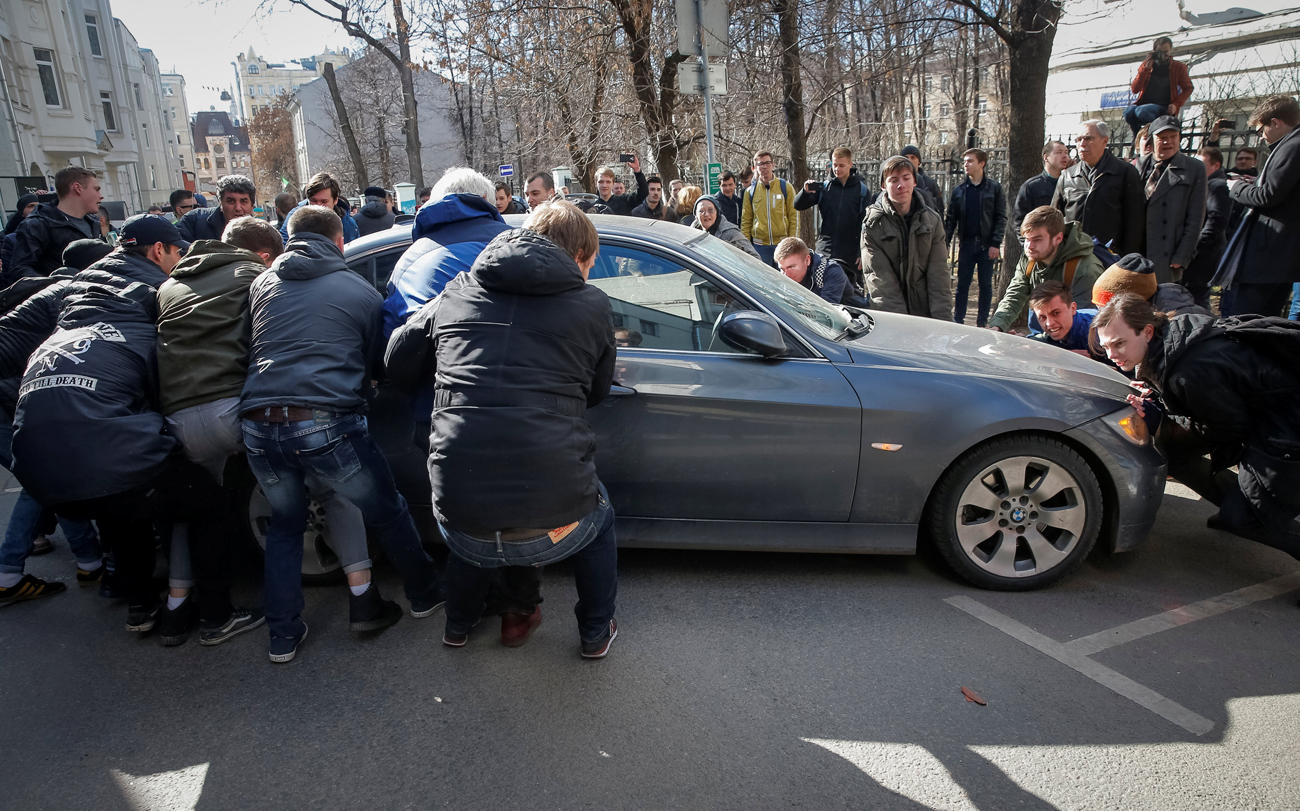 Opposition supporters move a car to block the road to prevent the van transporting detained anti-corruption campaigner and opposition figure Alexei Navalny during a rally in Moscow, March 26, 2017. / Photo: Reuters
Opposition supporters move a car to block the road to prevent the van transporting detained anti-corruption campaigner and opposition figure Alexei Navalny during a rally in Moscow, March 26, 2017. / Photo: Reuters
“Like everybody else, we are here because we want to get an answer. This is our first protest, we heard about it through social networks. And if there is no answer, we shall come again,” they said. And what if there is an answer but you are not happy with it? – I asked. “We don’t know yet… we haven’t thought about it yet. It’s just cool that all these people did not remain sitting at home. It’s been a long time since anything like this happened here!”
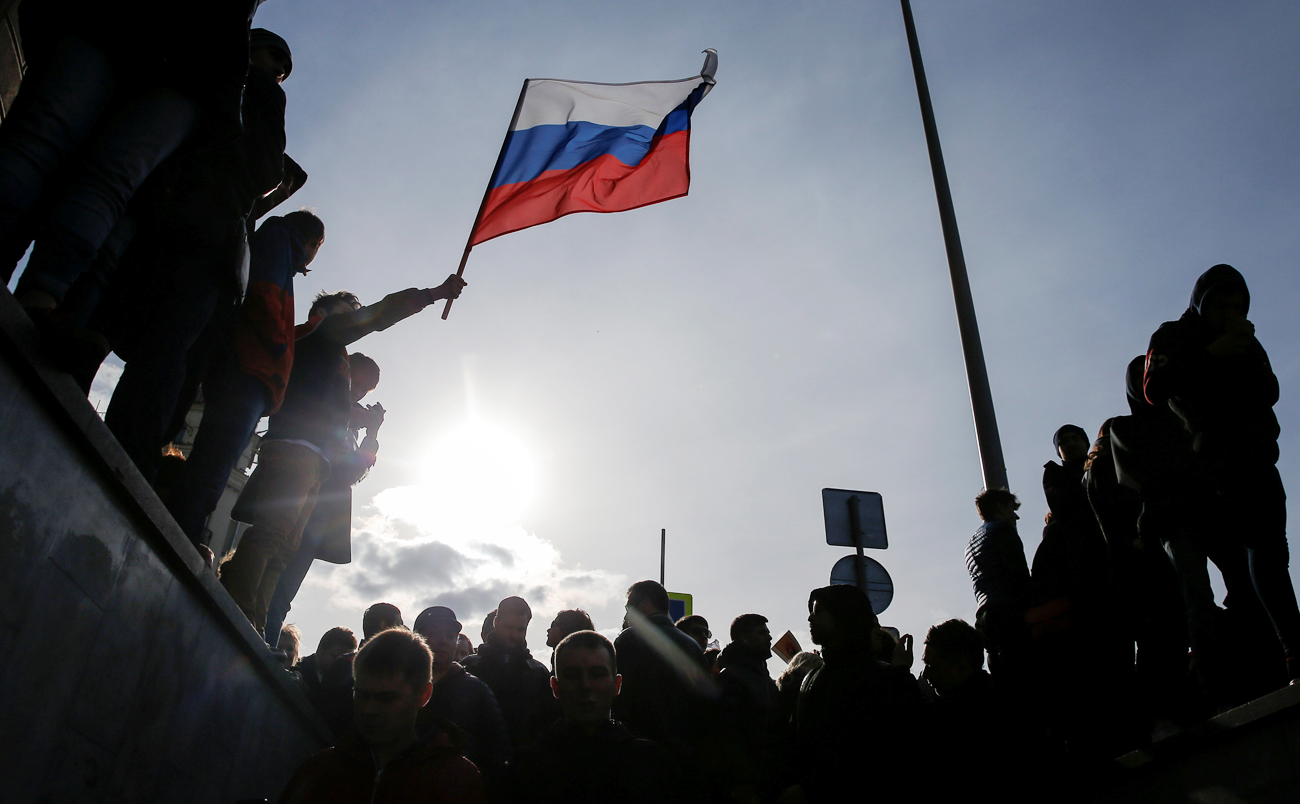 Opposition supporters attend a rally in Moscow, March 26, 2017. / Photo: Reuters
Opposition supporters attend a rally in Moscow, March 26, 2017. / Photo: Reuters
How would you assess this protest?
Read more: What happened to Russia's political protests?
If using any of Russia Beyond's content, partly or in full, always provide an active hyperlink to the original material.
Subscribe
to our newsletter!
Get the week's best stories straight to your inbox